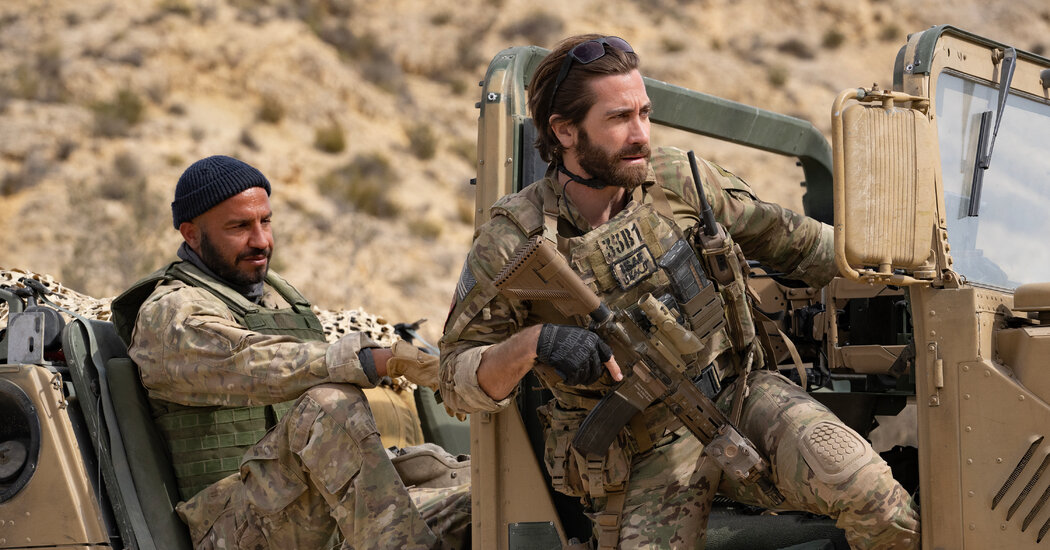“Guy Ritchie’s The Covenant” – 3 1/2 stars out of 4
“Guy Ritchie’s The Covenant” is a good movie that is a tough watch, and a perfect illustration of the way text and context shapes your experience with a film. On its own, it’s a tense and dramatic fictional story of loyalty and honor and brotherhood, but at the same time, it’s a story that plays out under the foreboding non-fictional shadow of what the audience knows is to come in the months after the final credits.
“The Covenant” is set in 2018, almost two decades after the United States sent troops into Afghanistan in the aftermath of the 9/11 terrorist attacks. The fatigue of the conflict is obvious in the faces and demeanor of Sergeant John Kinley (Jake Gyllenhall) and his men, who go about their daily routine of chasing down suspect leads on the hunt for ammunitions and evildoers. As they execute their duties up and down the streets of ravaged Afghan towns and villages, we feel a sense of claustrophobia and futility at the challenge of their fish-out-of-water circumstances.
Fed up with the bad leads and bad intelligence, Kinley decides to use more non-traditional channels to yield better results, and recruits a new translator named Ahmed (Dar Salim) in his cause. Right away we get the sense that this new arrangement will simultaneously increase the likelihood of success as well as the level of imminent danger, as Ahmed proves he has savvy well beyond his linguistic skills.
This sense gets rewarded in dramatic fashion as Kinley’s team locates a primary weapons depot, and is immediately ambushed by Taliban fighters. Ahmed and Kinley are the only survivors of a harrowing battle, though the Sergeant is critically injured, and his translator has to transport him miles through the desert avoiding detection to escape.
The heroic episode takes a dark turn when, once home and recovering, Kinley learns that his former translator has been forced to take his family underground as a result of the rescue, in spite of an arrangement that was supposed to have granted cooperative Afghans passage to America for their efforts.
What happens next will not be spoiled in this review, though in a way it doesn’t matter, because anyone who watches “The Covenant” will likely understand what is to come not long after its fictional story concludes. By fall of 2021, American forces will withdraw, leaving many Afghan collaborators behind to face traitorous accusations from an ascendant Taliban regime.
The shadow of the future puts a dour twist on what remains an engaging and thrilling feature, and even when the audience begins to anticipate its dramatic conclusion, Ritchie still delivers in a way that is stunning. No doubt this juxtaposition is intentional, as the closing title cards outline what unfolds across Afghanistan in the months after “The Covenant’s” narrative.
In a way, it’s natural to see “The Covenant” as a microcosm of how Ritchie sees the greater relationship between the United States and the people of Afghanistan…a promise in need of fulfillment. If you don’t have a lot of background on its setting, “The Covenant” remains a moving and gripping war story, one that zeroes in on powerful themes of loyalty and duty. But with that background, its meaning and resonance become that much more sobering.
For their part, Gyllenhall and especially Salim shine in their roles, and play out a meaningful relationship arc from a partnership of circumstance to a noble bond worthy of personal sacrifice. And though hints and flashes of Ritchie’s trademark kinetic editing and storytelling style occasionally remind the viewers who is behind the camera, the style is notably toned down compared to better-known examples from the director’s catalog, like “Snatch” or the Robert Downey Jr. “Sherlock Holmes” films.
As you might expect, “Guy Ritchie’s The Covenant” draws an R rating for a combination of profanity and war violence. But to its credit, the violence is played for authenticity more than spectacle, and aside from a dramatic montage partway through the film, the profanity feels more natural than artificial.
By keeping these more “Hollywood” elements in check, Ritchie is better able to preserve the sincerity of “The Covenant,” and completes one of 2023’s better films so far.

